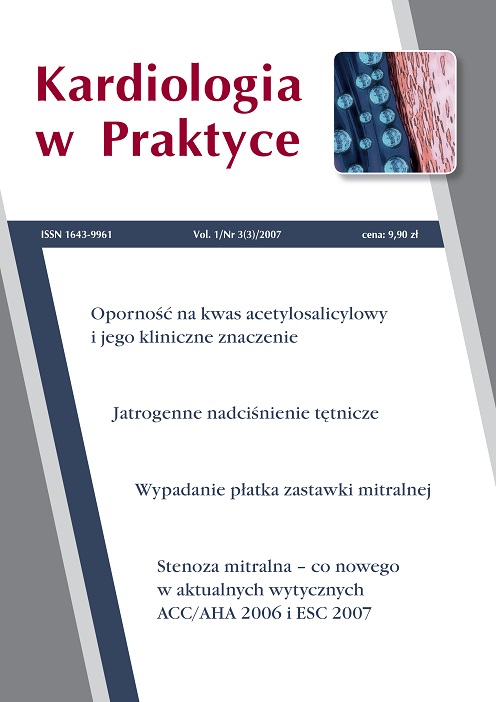Oporność na leki moczopędne – jak postępować? Artykuł przeglądowy
##plugins.themes.bootstrap3.article.main##
Abstrakt
Leki moczopędne są podstawą farmakoterapii u osób z niewydolnością serca, której towarzyszą objawy związane z retencją płynów. Jeśli dochodzi do utraty efektu moczopędnego, zanim osiągnięty zostanie cel terapeutyczny w postaci ustąpienia obrzęków i objawów przewodnienia, rozpoznajemy oporność na diuretyki. Najczęstszą przyczyną wczesnej oporności na diuretyk jest nieprzestrzeganie zalecenia ograniczenia podaży sodu. Późna oporność wynika ze zmian adaptacyjnych w dystalnej części nefronu oraz wtórnego hiperaldosteronizmu. Do sposobów przełamywania oporności na zastosowane leczenie moczopędne zaliczamy terapię skojarzoną diuretykami o różnych mechanizmach działania: zwiększenie dawki i częstości podawanego leku, przejście z leczenia doustnego na dożylne, w tym na podawanie leków w ciągłym wlewie dożylnym. Wlewy z furosemidu stosujemy jedynie u pacjentów hospitalizowanych, którzy wcześniej zareagowali na leczenie bolusem. Jeśli na dożylny bolus leku pacjent nie reagował, trudno spodziewać się reakcji na stały wlew. Pojawienie się na rynku nowoczesnych aparatów do hemofiltracji oraz małoinwazyjnych i niewymagających kaniulizacji żył centralnych urządzeń do ultrafiltracji spowodowało zwiększenie zainteresowania ultrafiltracją w leczeniu niewydolności serca. Najnowsze doniesienia wskazują, że ultrafiltracja stanowi bezpieczną metodę zwalczania opornego przewodnienia u osób z niewydolnością serca.
Pobrania
##plugins.themes.bootstrap3.article.details##

Utwór dostępny jest na licencji Creative Commons Uznanie autorstwa – Użycie niekomercyjne – Bez utworów zależnych 4.0 Międzynarodowe.
Copyright: © Medical Education sp. z o.o. This is an Open Access article distributed under the terms of the Attribution-NonCommercial 4.0 International (CC BY-NC 4.0). License (https://creativecommons.org/licenses/by-nc/4.0/), allowing third parties to copy and redistribute the material in any medium or format and to remix, transform, and build upon the material, provided the original work is properly cited and states its license.
Address reprint requests to: Medical Education, Marcin Kuźma (marcin.kuzma@mededu.pl)
Bibliografia
2. Kirchner K.A., Voelker J.R., Brater D.C.: Intratubular albumin blunts the response to frusemide-A mechanism for diuretic resistance in the nephrotic syndrome. J. Pharmacol. Exp. Ther. 1990, 252:1097.
3. Brater D.C.: Diuretic therapy. N. Engl. J. Med. 1998, 339:387-95.
4. Hamm L.L., Batuman V.: Edema in the Nephrotic Syndrome: New Aspect of an Old Enigma. J. Am. Soc. Nephrol. 2003, 14(12).
5. Sica D.A.: Diuretic-Related Side Effects: Development and Treatment. J. Clin. Hypertens. 2004, 6(9):532.
6. Heywood J.T.: Combining nesiritide with high-dose diuretics may increase the risk of increased serum creatinine. J. Card., Fail 2005, 11 (supl.): S154.
7. Ferreira A., Bettencourt P., Pimenta J. et al.: The renal dopaminergic system, neurohumoral activation, and sodium handling in heart failure. Am. Heart. J. 2002, 143:391-7.
8. Ungar A., Fumagalli S., Marini M. et al.: Renal, but not systemic, hemodynamic effects of dopamine are influenced by severity of congestive heart failure . Crit. Care Med. 2004, 32:1125–1129.
9. Marik P.E.: Low-dose dopamine: a systematic review. Intens. Care Med. 2002, 28:877-883.
10. Elkayam U., Tasissa G., Binanay C. et al.: Use and impact of inotropes and vasodilator therapy during heart failure hospitalization in the ESCAPE Trial. Circulation 2004, 110 (supl. 3):515.
11. Sharma A., Hermann D.D., Mehta R.L.: Clinical benefit and approach of ultrafiltration in acute heart failure. Cardiology 2001, 96:144-154.
12. Jaski B.E., Ha J., Dentys B.G. et al.: Peripherally inserted veno-venous ultrafiltration for rapid treatment of volume overloaded patients. J. Card. Fail 2003, 9:227-31.
13. Costanzo M.R. for the UNLOAD Investigators. Late-Breaking Clinical Trial presented at the 2006 American College of Cardiology Scientific 55th Annual Scientific Session. Ultrafiltration versus intravenous diuretics for patients hospitalized for acute decompensated heart failure. March 11-14, 2006. Atlanta, Georgia.
14. Levey A.S.: Assessing the effectivness of therapy to prevent the progression of renal disease. Am. J. Kidney Dis. 1993, 22(1):207-14.
